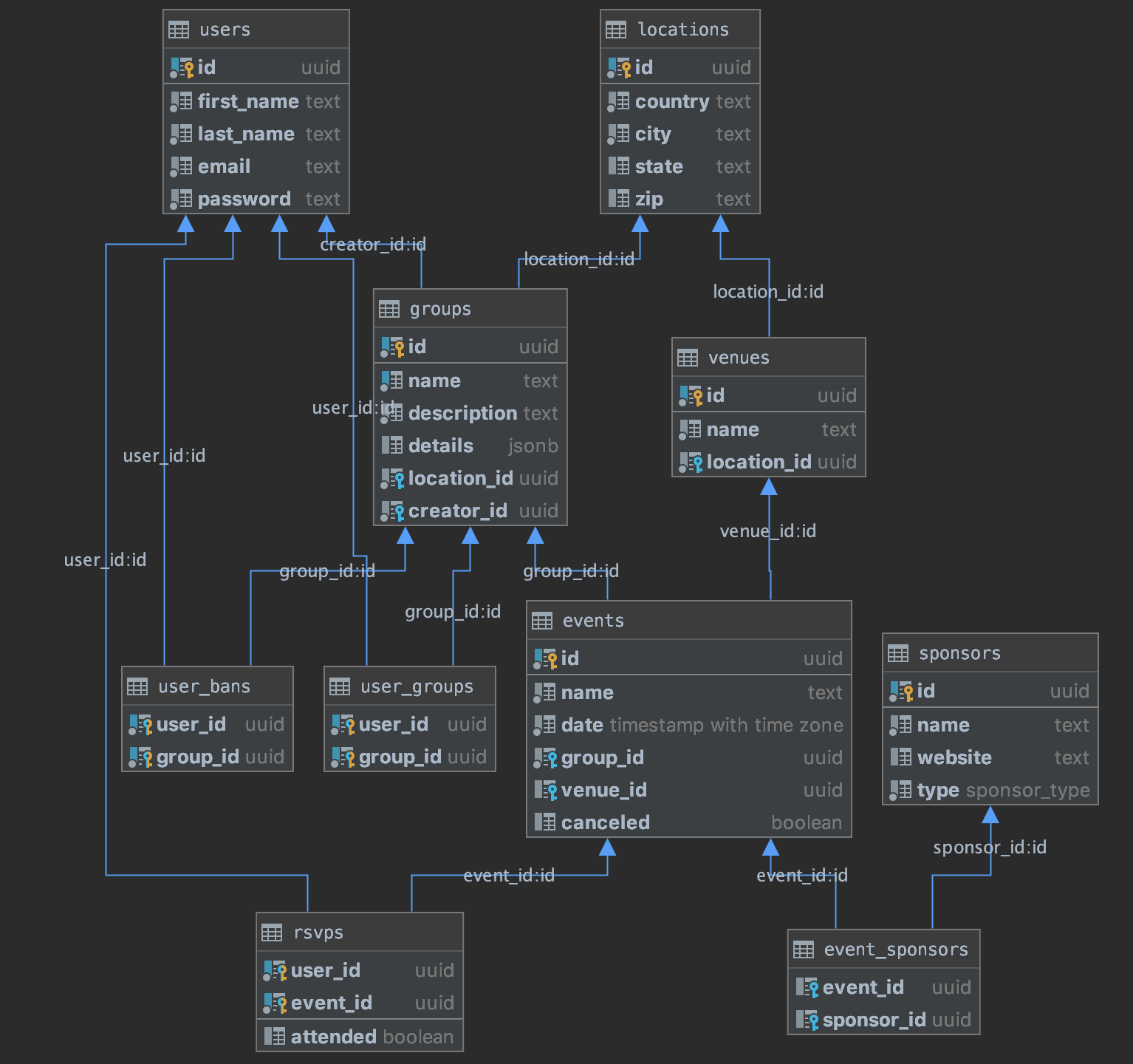Welcome to Chapter
After several years of being dissatisfied with existing group event tools (Meetup, Facebook events) we decided to build our own.
This will be a self-hosted Docker container that you can one-click deploy to the cloud, then configure through an admin panel. No coding required.
Your nonprofit can sub-domain it to your website like chapter.sierraclub.org or chapter.womenwhocode.org.
You can use your own authentication tools. And all your user data will stay on your own server.
Tech stack
We're planning to use the following tools:
- Node.js / Express for our backend
- Postgres with Sequelize
- Elasticsearch
- A React frontend using JavaScript (not TypeScript) and CSS (not Sass)
A lot of people know these tools, and they're proven to work well at scale.
We are considering using a tool like Next.js to get up and running faster.
We will focus on building an open API first. Then developers can use the API to build their own mobile clients and voice interface clients.
Quick Links
- Tech Stack (Closed)
- Next Steps
- Feature Dev / Stories
- API
- Documentation
- Shared Profile Data & Auth Across Collectives
- Discovery and Searching Across Collective Instances
- Mobile Apps
- UX - Design Landing page
- Internationalization / Translation
- Accessibility
- Ideas for Version 1 or Version 2 of the App
- Introduce Yourself / Volunteer Your Skills
Terminology
To better communicate and more easily build an API and UI, we've decided on a collection of terminology to describe Chapter in a clear way.
- A "collective" is one singular instance/deployment of Chapter
For example, Women who Code at the domain
chapter.womenwhocode.com - A "user" is a person who authed to the chapter For example, Kognise
- A "chapter" is a container for events, with a description and subscribers, and one or more "admins" who can manage it For example, Women who Code NYC
- A "event" is a single meetup that users can RSVP to, has a specific location and time, and has "organizers" For example, Women who Code NYC April Meetup
(All of the above examples are fictional, meaningless, and probably super inaccurate)
Schema
User Stories so far
Our goal is to keep things simple and not reinvent wheels.
So far we have only two user roles: participants and group organizers
As a future participant
-
I can use a search box on the landing page to input a city, state, or country name and it will autocomplete. I can click one of those locations.
-
When I click one of those locations, I can see the "show view" for that event's group, with details about the upcoming event, along with a button to RSVP.
-
I can click the "RSVP" button. When I do, I will be prompted to sign in. Then I will receive an email with a ticket and add me to the public list of event attendees.
-
I will receive a second email the day before the event to remind me.
-
After the event, I will automatically get emails notifying me of subsequent events.
-
I can filter all events in my location by tag/interests.
As an organizer
-
I can create a group.
-
I can edit details about the group, including a Slack/Discord/Facebook/WeChat/WhatsApp link participants can join to discuss and coordinate events.
-
I can create events, and set their location and capacity.
-
I can cancel events.
-
I can email the entire list of participants.
-
I can ban a participant whom I believe is toxic or who has previously broken my organization's code of conduct.
-
I can add a venue sponsor to the event with a link to their website as a way of thanking them for hosting.
-
I can add a food sponsor to the event with a link to their website as a way of thanking them for food.
I can see how many times a participant has come to the event as well as their attendance rate
Roadmap
- Design the schema
- Set up the API endpoints
- Build the web client and let other developers use the API to build mobile clients and voice interface clients
Quincy Larson is the project lead.
freeCodeCamp will start "dogfooding" this as soon as possible with several of its local study groups.
Here's an out-dated example of an app with similar functionality: The freeCodeCamp Study Group Directory.
To ask a question or share an idea, create a GitHub issue on this repository.
And join our Discord server where we're chatting while we build this.
